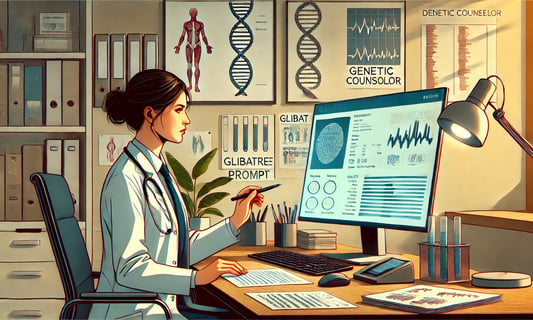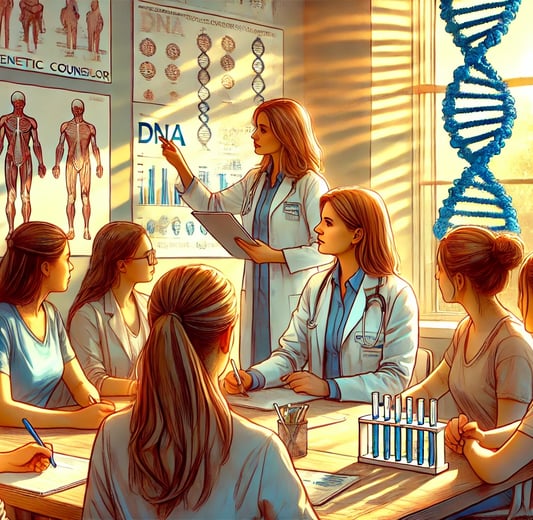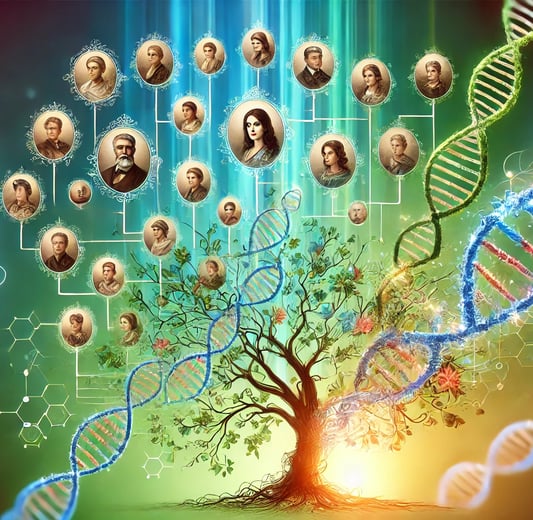Uncovering the Diverse Tasks of a Genetic Counselor's Day Updated
Explore the diverse tasks of a genetic counselor's day, from patient appointments to genetic testing coordination and advocacy.
CAREER ADVICECAREER INFORMATION


Uncovering the Diverse Tasks of a Genetic Counselor's Day
The field of genetic counseling is an ever-evolving domain, playing a pivotal role in healthcare. Genetic counselors are indispensable, guiding patients through the complexities of genetic information, testing, and its implications. This article delves into the multifaceted tasks that fill a genetic counselor's day, showcasing their integral contribution to patient care and the healthcare system at large.
Genetic counseling stands at the intersection of medical science and compassionate care. As genetics rapidly advances, the need for specialized professionals who can interpret genetic data and provide emotional support becomes crucial. Genetic counselors fill this niche, offering personalized care, facilitating genetic testing, and advocating for patients' needs. This exploration of their daily responsibilities reveals the depth and breadth of their role in healthcare.
A Day in the Life of a Genetic Counselor
Morning Preparations: Setting the Stage
A genetic counselor's day often begins with meticulous preparation. Reviewing patient files, planning the day's schedule, and coordinating with laboratory services set the tone for a structured and efficient workflow. This initial phase is crucial for ensuring that patient interactions are meaningful and productive.
Patient Appointments: Personalized Care and Guidance
One of the most prominent aspects of a genetic counselor's day is patient appointments. These sessions are designed to assess patients' medical histories, understand their concerns, and provide tailored education on genetic conditions. Counselors use their expertise to explain complex genetic concepts in layman's terms, helping patients make informed decisions about their health.
Genetic Testing Coordination: Ensuring Accuracy and Efficiency
Coordinating genetic tests is another vital task. Counselors select appropriate tests based on individual patient profiles, explain the testing procedures, and obtain informed consent. They also manage logistics, such as scheduling sample collections and handling insurance paperwork, ensuring a smooth testing process.




Key Responsibilities of Genetic Counselors
Interpretation of Test Results: Decoding Complex Data
Once test results are available, genetic counselors interpret the data and communicate findings to patients. This involves translating scientific information into understandable terms and discussing potential health implications. Counselors provide a supportive environment for patients to ask questions and express concerns, helping them understand the results' significance.
Counseling and Emotional Support: Addressing Patient Concerns
A significant part of a genetic counselor's role is offering emotional support. Genetic testing can be an emotionally charged experience, filled with uncertainty and anxiety. Counselors help patients navigate these emotions, offering guidance, resources, and support groups to assist in coping with genetic diagnoses and making informed decisions about their health and family planning.
Documentation and Record Keeping: Maintaining Accuracy
Accurate documentation is essential in genetic counseling. Counselors maintain detailed records of patient interactions, test results, and counseling sessions. These records are critical for ongoing patient care and collaboration with other healthcare providers, ensuring continuity and comprehensiveness in treatment plans.




Collaboration in Healthcare
Working with Physicians: A Team Approach
Genetic counselors frequently collaborate with physicians and other healthcare professionals. This teamwork is essential for comprehensive patient care, ensuring that all aspects of a patient's health are considered. Counselors provide insights and recommendations based on genetic data, aiding in the development of holistic care plans.
Multidisciplinary Team Meetings: Comprehensive Care Plans
Participating in multidisciplinary team meetings allows genetic counselors to contribute their expertise to patient care. These meetings involve various healthcare professionals, such as geneticists, oncologists, and psychologists, who collectively address the patient's needs, ensuring a coordinated and thorough approach to treatment.


Continuous Learning and Professional Development
Keeping Up with Genetic Advances: Education and Training
The field of genetics is continually evolving, necessitating ongoing education for genetic counselors. Attending conferences, workshops, and webinars helps them stay updated on the latest advancements, ensuring they provide the most current and evidence-based care to their patients.
Ethical Considerations in Genetic Counseling: Navigating Challenges
Genetic counseling involves navigating complex ethical issues. Counselors must balance providing information with respecting patient autonomy and confidentiality. Continuous education in ethical practices is crucial for maintaining professionalism and patient trust.


Administrative and Research Tasks
Managing Administrative Duties: Behind the Scenes
Beyond direct patient care, genetic counselors handle various administrative tasks. These include managing electronic medical records, scheduling appointments, and ensuring compliance with healthcare regulations. Organizational skills are essential for balancing these responsibilities efficiently.
Engaging in Research: Contributing to Scientific Knowledge
Many genetic counselors engage in research to advance the field of genetics. They participate in studies, collect data, analyze findings, and publish their results. This research contributes to a deeper understanding of genetic conditions and improves counseling practices and patient outcomes.


Challenges and Rewards of the Profession
Emotional Demands: Supporting Patients Through Difficulties
The emotional demands of genetic counseling are significant. Counselors often support patients through challenging times, requiring resilience and compassion. Despite these challenges, the ability to make a positive impact on patients' lives is immensely rewarding.
Rewarding Experiences: Making a Difference
The profession offers numerous rewarding experiences. Helping patients understand their genetic health, providing emotional support, and seeing the positive outcomes of their guidance are just a few examples of the fulfillment genetic counselors find in their work.


Genetic counselors are essential to the healthcare system, offering specialized care that blends scientific knowledge with compassionate support. Their diverse tasks, from patient appointments to public outreach, highlight their crucial role in navigating the complexities of genetic conditions. Through continuous learning, collaboration, and advocacy, genetic counselors ensure that patients receive the best possible care, making a significant difference in the lives of individuals and families affected by genetic issues.


